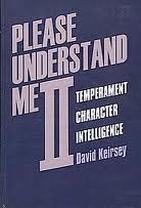
Summary of Contents
The author provides a thorough historical background of temperament theory, beginning with Plato (4th century BCE) and culminating with the work of Isabel Myers (1958). Having established a basic schema of four temperaments, Keirsey distinguishes his categorizations (Artisan, Guardian, Idealist, Rational) from the Myers-Briggs groupings (SP, SJ, NF, NT) and discusses each of the temperaments at length. The author emphasizes the danger of what he calls the “Pygmalion Project.” This is the tendency to interpret others’ differences from one’s own way of acting or approaching reality as “wrong” and as something to be corrected. This leads to furtive attempts to change other people’s natural personality and temperament, which can only exacerbate problems. The author provides a discussion of how each of the temperaments approach mating (chapter 7), parenting (chapter 8), and leadership (chapter 9). This edition features an updated temperament sorter (4-11) which allows the reader to determine his or her MBTI type. For those interested in simply discovering temperament, the author provides a sixteen question “type sorter” (341).

 RSS Feed
RSS Feed
